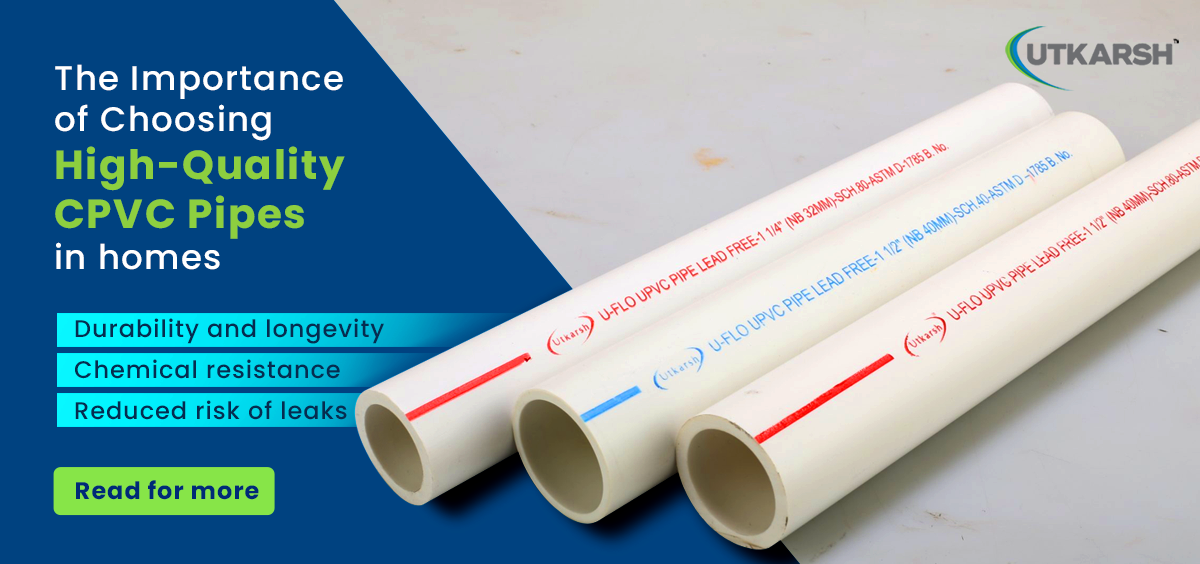Blog
-

Why Hardik Pandya is the best fit as ambassador for Pipes ka All-Rounder - Utkarsh Pipes and Fittings
Hardik Pandya's unmatched versatility makes him the ideal ambassador for Utkarsh Pipes & Fittings' Pipes ka All-Rounder. Learn why he's the perfect fit....
Read More -

The hidden costs of traditional pipes: Why HDPE pipes are a smarter investment?
Discover the hidden costs of traditional pipes & why HDPE pipes are a smarter investment. Explore Utkarsh India's durable, corrosion-resistant solutions....
Read More -

Useful insights on Utkarsh India’s SWR pipes and fittings
Discover insights on Utkarsh India's high-quality SWR pipes and fittings. Explore durable, corrosion-resistant solutions for efficient drainage systems....
Read More -

Future trends in galvanised piping: Useful insights by a leading GI pipe manufacturer in India
Discover future trends in galvanised piping with insights from Utkarsh India, a leading GI pipe manufacturer. Explore innovative solutions for durable infrastructure....
Read More -

Signs that your uPVC pipes need professional attention
Identify signs of uPVC pipe issues & know when to seek professional help. Ensure reliable plumbing with Utkarsh India's durable uPVC pipes & fittings....
Read More -

The significance of GI pipes in rural communities
Learn why GI pipes are vital for rural communities: durability, accessibility, versatility, and improved sanitation. Explore our reliable GI pipe solutions....
Read More -

Why are HDPE pipes used for industrial applications?
Discover why HDPE pipes are favored in industrial settings. Learn about durability, cost-effectiveness, and environmental benefits. ...
Read More -

PVC pipes and chemical resistance: check these useful insights by one of the leading PVC pipe manufacturers
PVC pipes and chemical resistance: Insights from leading Indian PVC pipe manufacturer on durability, versatility, and cost-effectiveness....
Read More -

The importance of choosing high-quality CPVC pipes in homes
Discover the importance of high-quality CPVC pipes for durable and reliable home plumbing systems. Explore key benefits and trusted suppliers....
Read More -

Why is Utkarsh PVC Pipes one of the leading PVC pipe manufacturers?
Explore the excellence of Utkarsh PVC Pipes – a trusted name with 50+ years of manufacturing expertise. Discover UV stability, fire resistance, and more....
Read More -

Useful insights on PVC casing pipes and borewells
Get valuable information about PVC casing pipes and borewells in our blog. Utkarsh India provides insightful details on their applications, benefits, and industry expertise....
Read More -

Longevity and maintenance of CPVC pipes in hot water applications
Discover the lasting performance of CPVC pipes in hot water applications. Learn how their durability make them ideal for long-term use. Explore more insights in our blog....
Read More -

SWR pipe and fittings in residential vs. commercial settings
Different Applications of SWR Pipe & Fittings: Residential vs. Commercial Use. Learn how SWR systems serve diverse needs....
Read More -

Safety protocols in handling and installing PLB HDPE ducts
Essential safety protocols for handling and installing PLB HDPE ducts. Protect workers and infrastructure during installation....
Read More -

6 things to know about Utkarsh Water Tank
Discover Utkarsh Water Tanks: Food-grade, anti-microbial, UV-protected, easy installation, 10-year warranty, and various sizes available....
Read More -

7 useful insights on Utkarsh HDPE Pipes
Discover the durability, versatility, and efficiency of Utkarsh HDPE Pipes – a trusted solution for diverse piping challenges. Choose reliability and longevity with us....
Read More -

The role of agriculture pipes and fittings: check these FAQs
Discover the importance of high-quality agricultural pipes and fittings for efficient water management and chemical application in farming....
Read More -

Faqs on MS Pipe, Applications and Advantages
As one of the reputed MS pipe manufacturing companies in India, Utkarsh India have curated some FAQs and their answers on MS pipe, applications & advantages...
Read More -

Useful Insights on Selecting Pipes and Piping Materials
If you are looking to buy the best quality PVC pipes and fittings, explore Utkarsh India�"�s PVC casing pipes, CPVC pipes and uPVC pipes....
Read More -
How to start a farm in India?
If you want to start a farm in India here are some useful insights by Utkarsh India, one of the leading PVC casing & HDPE pipe manufacturer....
Read More -
What Kind of Pipes Are Used for Drinking Water?
To prevent contamination of the drinking water, good quality drinking water pipes like cpvc, pvc etc should be used in a well-planned & designed water distribution network....
Read More -
Signs that your commercial building needs to be repiped
If you are looking to buy the PVC water distribution pipe for your commercial building, explore Utkarsh PVC Casing Pipes which is easy to install and transport....
Read More -
How to streamline water conservation in commercial buildings?
Commercial buildings use large amounts of water. Water conservation is important for all businesses because fresh clean water is a limited resource, as well as a costly one. ...
Read More -
How to select a column riser pipe manufacturer?
...
Read More -
Key features to look for when selecting agriculture pipes and fittings
...
Read More -

Choosing The Right Pipe For Your Applications
The most common plastic pipes are PVC Pipe, CPVC Pipe and UPVC Pipe. Here are in detail description of each three so you can pick the right one for all your needs. ...
Read More

